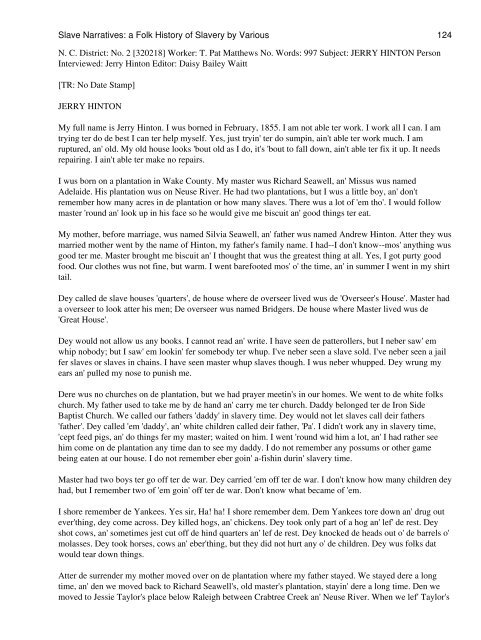Slave Narratives: a Folk History of Slavery in the United States
Slave Narratives: a Folk History of Slavery in the United States
Slave Narratives: a Folk History of Slavery in the United States
Create successful ePaper yourself
Turn your PDF publications into a flip-book with our unique Google optimized e-Paper software.
<strong>Slave</strong> <strong>Narratives</strong>: a <strong>Folk</strong> <strong>History</strong> <strong>of</strong> <strong>Slave</strong>ry by Various 124N. C. District: No. 2 [320218] Worker: T. Pat Mat<strong>the</strong>ws No. Words: 997 Subject: JERRY HINTON PersonInterviewed: Jerry H<strong>in</strong>ton Editor: Daisy Bailey Waitt[TR: No Date Stamp]JERRY HINTONMy full name is Jerry H<strong>in</strong>ton. I wus borned <strong>in</strong> February, 1855. I am not able ter work. I work all I can. I amtry<strong>in</strong>g ter do de best I can ter help myself. Yes, just try<strong>in</strong>' ter do sump<strong>in</strong>, a<strong>in</strong>'t able ter work much. I amruptured, an' old. My old house looks 'bout old as I do, it's 'bout to fall down, a<strong>in</strong>'t able ter fix it up. It needsrepair<strong>in</strong>g. I a<strong>in</strong>'t able ter make no repairs.I wus born on a plantation <strong>in</strong> Wake County. My master wus Richard Seawell, an' Missus wus namedAdelaide. His plantation wus on Neuse River. He had two plantations, but I wus a little boy, an' don'tremember how many acres <strong>in</strong> de plantation or how many slaves. There wus a lot <strong>of</strong> 'em tho'. I would followmaster 'round an' look up <strong>in</strong> his face so he would give me biscuit an' good th<strong>in</strong>gs ter eat.My mo<strong>the</strong>r, before marriage, wus named Silvia Seawell, an' fa<strong>the</strong>r wus named Andrew H<strong>in</strong>ton. Atter <strong>the</strong>y wusmarried mo<strong>the</strong>r went by <strong>the</strong> name <strong>of</strong> H<strong>in</strong>ton, my fa<strong>the</strong>r's family name. I had--I don't know--mos' anyth<strong>in</strong>g wusgood ter me. Master brought me biscuit an' I thought that wus <strong>the</strong> greatest th<strong>in</strong>g at all. Yes, I got purty goodfood. Our clo<strong>the</strong>s wus not f<strong>in</strong>e, but warm. I went barefooted mos' o' <strong>the</strong> time, an' <strong>in</strong> summer I went <strong>in</strong> my shirttail.Dey called de slave houses 'quarters', de house where de overseer lived wus de 'Overseer's House'. Master hada overseer to look atter his men; De overseer wus named Bridgers. De house where Master lived wus de'Great House'.Dey would not allow us any books. I cannot read an' write. I have seen de patterollers, but I neber saw' emwhip nobody; but I saw' em look<strong>in</strong>' fer somebody ter whup. I've neber seen a slave sold. I've neber seen a jailfer slaves or slaves <strong>in</strong> cha<strong>in</strong>s. I have seen master whup slaves though. I wus neber whupped. Dey wrung myears an' pulled my nose to punish me.Dere wus no churches on de plantation, but we had prayer meet<strong>in</strong>'s <strong>in</strong> our homes. We went to de white folkschurch. My fa<strong>the</strong>r used to take me by de hand an' carry me ter church. Daddy belonged ter de Iron SideBaptist Church. We called our fa<strong>the</strong>rs 'daddy' <strong>in</strong> slavery time. Dey would not let slaves call deir fa<strong>the</strong>rs'fa<strong>the</strong>r'. Dey called 'em 'daddy', an' white children called deir fa<strong>the</strong>r, 'Pa'. I didn't work any <strong>in</strong> slavery time,'cept feed pigs, an' do th<strong>in</strong>gs fer my master; waited on him. I went 'round wid him a lot, an' I had ra<strong>the</strong>r seehim come on de plantation any time dan to see my daddy. I do not remember any possums or o<strong>the</strong>r gamebe<strong>in</strong>g eaten at our house. I do not remember eber go<strong>in</strong>' a-fish<strong>in</strong> dur<strong>in</strong>' slavery time.Master had two boys ter go <strong>of</strong>f ter de war. Dey carried 'em <strong>of</strong>f ter de war. I don't know how many children deyhad, but I remember two <strong>of</strong> 'em go<strong>in</strong>' <strong>of</strong>f ter de war. Don't know what became <strong>of</strong> 'em.I shore remember de Yankees. Yes sir, Ha! ha! I shore remember dem. Dem Yankees tore down an' drug outever'th<strong>in</strong>g, dey come across. Dey killed hogs, an' chickens. Dey took only part <strong>of</strong> a hog an' lef' de rest. Deyshot cows, an' sometimes jest cut <strong>of</strong>f de h<strong>in</strong>d quarters an' lef de rest. Dey knocked de heads out o' de barrels o'molasses. Dey took horses, cows an' eber'th<strong>in</strong>g, but <strong>the</strong>y did not hurt any o' de children. Dey wus folks datwould tear down th<strong>in</strong>gs.Atter de surrender my mo<strong>the</strong>r moved over on de plantation where my fa<strong>the</strong>r stayed. We stayed dere a longtime, an' den we moved back to Richard Seawell's, old master's plantation, stay<strong>in</strong>' dere a long time. Den wemoved to Jessie Taylor's place below Raleigh between Crabtree Creek an' Neuse River. When we lef' Taylor's
















